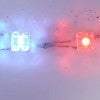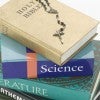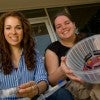

Nanotubes assemble! Rice introduces ‘Teslaphoresis’
Scientists at Rice University have discovered that the strong force field emitted by a Tesla coil causes carbon nanotubes to self-assemble into long wires, a phenomenon they call “Teslaphoresis.”

Rice's César A. Uribe is developing computational tools to help scientists better understand ecosystems with recent studies using AI to glean new insi...

Rice’s Grand Hall was filled with students, music and festivities Sept. 15 as the university began its many celebrations as part of Hispanic Heritage ...

New research using NASA’s Perseverance rover has uncovered strong evidence that Mars’ Jezero Crater experienced multiple episodes of fluid activity — ...

For the first time since the 2021 season, the Rice soccer team is nationally ranked in the United Soccer Coaches Top 25 Poll, earning the 25th spot in...

With the 2025–26 academic year underway, Rice is taking bold steps to harness the transformative potential of artificial intelligence in teaching, res...

Rice’s football team will open American Conference play under the Thursday night lights this week, traveling to face the University of North Carolina ...

Rice senior safety Plae Wyatt is one of 22 college football players and one head coach who have been named to the 2025 Allstate AFCA Good Works Team®,...

Rice researchers have developed a faster and cleaner method for recovering aluminum and removing toxic metals from bauxite residue....

Rice has partnered with Google for Education to adopt Google’s generative AI solution, Gemini for Education, to provide students, faculty and staff wi...

Rice Real Estate Co., in partnership with Lincoln Property Co., has unveiled plans to develop a landmark research, laboratory and office building desi...

This summer, Rice senior Maya Harpavat traded the lecture halls of Houston for the winding roads of Rajasthan, India....

The Ken Kennedy Institute at Rice will host the fourth annual AI in Health Conference this month, aiming to forge interdisciplinary, cross-institution...

Nanotubes assemble! Rice introduces ‘Teslaphoresis’
Scientists at Rice University have discovered that the strong force field emitted by a Tesla coil causes carbon nanotubes to self-assemble into long wires, a phenomenon they call “Teslaphoresis.”

First worldwide survey of religion and science: No, not all scientists are atheists
Scientists at Rice University have discovered that the strong force field emitted by a Tesla coil causes carbon nanotubes to self-assemble into long wires, a phenomenon they call “Teslaphoresis.”

JFK’s 1962 moon speech still appeals 50 years later
Few moments in Rice’s history are as well known or oft remarked upon as the 1962 speech in which President John F. Kennedy boldly declared, “We choose to go to the moon!”

The story behind Rice traditions
Every university has its traditions, and Rice University is no exception. O-Week, Beer Bike and Willy Week top the list of Rice’s most well-known traditions, but in the university’s nearly 100-year history, it’s only natural for a few others to have developed along the way.

Revolution with a salad spinner
A simple salad spinner will save lives this summer, if everything goes as planned by two Rice University undergraduates.

Rice study suggests people are more trusting of attractive strangers
Beware of strangers. Don’t judge a book by its cover. We repeat these timeworn adages without even thinking, but new research suggests we live by neither of them.

Nanotech pioneer, Nobel laureate Richard Smalley dead at 62
Nobel laureate Richard Smalley, co-discoverer of the buckyball, died from cancer in Houston. He was 62.